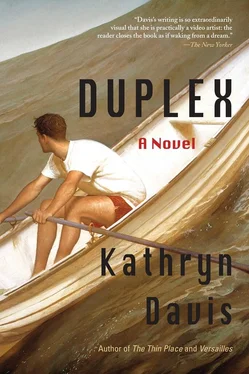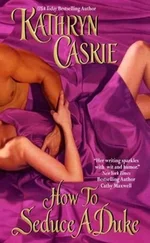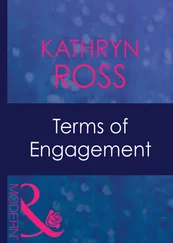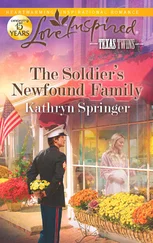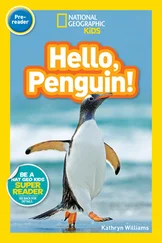There was one particular book Mary read to her daughter at bedtime. Every time they came to the picture of a pair of elephants dressed up like human beings on their way out of a house, Blue-Eyes would wave at Mary — sweetly, plaintively — and mouth the word bye. Mary didn’t think her own mother had ever read her to sleep. Her mother had been a night owl, meaning she stayed awake until all hours drinking highballs and watching television talk shows, hearing “personalities” promote their views on a variety of topics they knew nothing about but that Mary’s mother then ardently espoused. She wasn’t stupid, she was an alcoholic it had taken Mary a while to realize this.
By now the two women had reached the top of the Avenue. At this point they could fork left around the trolley barn in the direction of Mary’s house, or fork right down Rex to the Woodard Estate. From somewhere up above came the scissoring sound of raptors doing maneuvers.
“Do you want to come back with me for lunch?” Mary asked.
“Listen to me, Mary,” Cindy said, and now her voice was inside Mary’s brain. It was like that time at recess on the swing set when Cindy linked arms with her and began swinging and the next thing Mary knew she was in the dark corner of the playground the trash blew into. That had been so long ago — she’d had no idea then where her life was headed.
“Do you know what would happen if even one single molecule of Blue-Eyes didn’t exist?” Cindy’s voice asked Mary from inside Mary’s brain.
They had turned right toward the Woodard Estate, without further discussion. “Nothing?” Mary said. Blue-Eyes had already lost several of her sharp pointed baby teeth and Mary had seen no reason to keep them. Her hair, too — Blue-Eyes had lost most of the first, colorless hair that had grown into her smooth bald scalp. Her hair was brown now, like Mary’s.
“No,” Cindy said. “I don’t mean a molecule that gets thrown away or turned into something else. I mean a molecule that existed and suddenly doesn’t exist. One single molecule, that’s all it will take. One little hole. That’s how the world will end, Mary. When you think you’re imagining the worst you aren’t even close. Do you hear me? This world. Why don’t you ask your husband if you don’t believe me.”
“My husband?”
“Stop answering questions with questions!”
They had entered the estate on a narrow trail that cut through what had once been a magnificent cedar hedge trimmed to resemble a high stone wall with topiary urns at regular intervals. Now the hedge had no obvious shape at all, some sections being very tall or very short or sending forth irregular branches in all directions like the mind of a madman. This was what Walter’s father had turned out to be, matter — as is so often the case — having no alternative but to imitate mind. Whatever Walter was, he wasn’t a madman, of that Mary felt certain.
The path through the hedge went on and on, more like a tunnel, and was laced with roots; small creatures raced past, brushing against Mary’s ankles in their hurry to get wherever they were going, which seemed to be away from the estate and not into it. As far ahead as she could see the path was dappled with pale white spots that shifted when she wasn’t looking at them. It was like sunlight was falling onto the path through the interwoven cedar boughs above her head, but Mary knew this couldn’t be possible since at some point not long after they’d entered the path, night had fallen. Blue-Eyes was wide awake and had raised herself into a seated posture unassisted, something the books claimed she wouldn’t be doing for another six months. Cindy was nowhere to be seen.
“This is ridiculous,” Mary said. It was becoming more and more difficult to push the carriage across the tangled roots, not to mention the horrible sound — as if its soul was being squeezed into the dirt — that came out of one of the escaping creatures when she accidentally ran it over with the carriage. She ought to be in her kitchen making dinner. Walter would be arriving home any minute; tonight was fish sticks. Of course she hadn’t brought a flashlight — she hadn’t thought she’d need one. She had forgotten how quickly the days grew short this time of year. If there was a moon Mary couldn’t see it.
She came to a halt and Blue-Eyes began to scream. “Stop it!” Mary said. “Stop it!” She was trying to turn the carriage around but one of its wheels had gotten caught on something. “Just be patient,” she said, and Blue-Eyes screamed louder. “I’m trying,” Mary said.
“You have to try harder, Mother,” said Blue-Eyes. “Weren’t you listening to”—and here she said a name Mary knew was supposed to be “Cindy.” Blue-Eyes was sitting all the way up now and was much too big to be riding in a baby carriage.
They were no longer in the tunnel but in a clearing, an immense meadow that appeared to have been recently mowed and was dotted with several large haystacks, the whole thing surrounded by cedar trees. It was as if the narrow space they’d been in had suddenly swelled and the cedars along with it, the wall of trees getting thinner and thinner and moving farther and farther away, like a balloon being blown up — when she thought about it, Mary realized she couldn’t remember ever coming out of the tunnel. The sky, on the other hand, didn’t look anything like the sky had looked before. It was as immense as the meadow, with a strangely bulging sliver of moon and loads of falling stars. The wind began to blow.
“Pssst,” something said very close at hand.
“Cindy?” Mary looked around but there was no one there.
“Pssst,” she heard again.
There at her feet lay the body of a big gray hare. By now everyone had come to take the hares for granted, the fact that wherever you went there they were, sitting up tall and staring into space with their huge gray eyes. They seemed to have appeared for some purpose — no one could tell you what — though the blond boy from the academy had capitalized on the mystery. In his one-man show his new paintings showed the hares larger than life-size, towering over everything, beginning with not-so-very-big things like birdbaths or mailboxes and ending up with houses and office buildings.
The hare at Mary’s feet seemed bigger than whatever it was she thought she had run over with the carriage. Its dead body frightened her, the glazed surface of its upward-facing eye reminding her of Eddie’s eyes that night after the prom. She tried to remember how long it had been since she’d last seen him, but she couldn’t. She thought it had been at the ballpark, before he got injured. She used to like watching him stand at the plate, wondering whether he knew she was there in the stands watching him. When they were younger she could tell from the way he stood, the curve at the small of his back — his body was attentive to her even if his mind was on the game. Then again, maybe the last time she saw him had been on the street before she moved away. Eddie had been wearing his Rockets uniform — she remembered the same photographer who had taken their picture at the prom posing him with the lawn mower at the foot of number 24’s extremely steep lawn. That was probably it, Mary thought. She still had the picture that she’d cut out of the newspaper; it was captioned “Local Hero.” After the photographer packed up his camera, Eddie went back inside, leaving his father to do the job.
The mower’s sound was one you almost never heard anymore, Mary thought, unless you counted the mower like sound of the raptors. The brightness of the sky, the freshness of the breeze, the forsythia in full bloom, like offshoots of sunlight. The winding of the horn, the horn in the wood. Dieu que le son du cor est triste au fond du Bois!
Читать дальше
